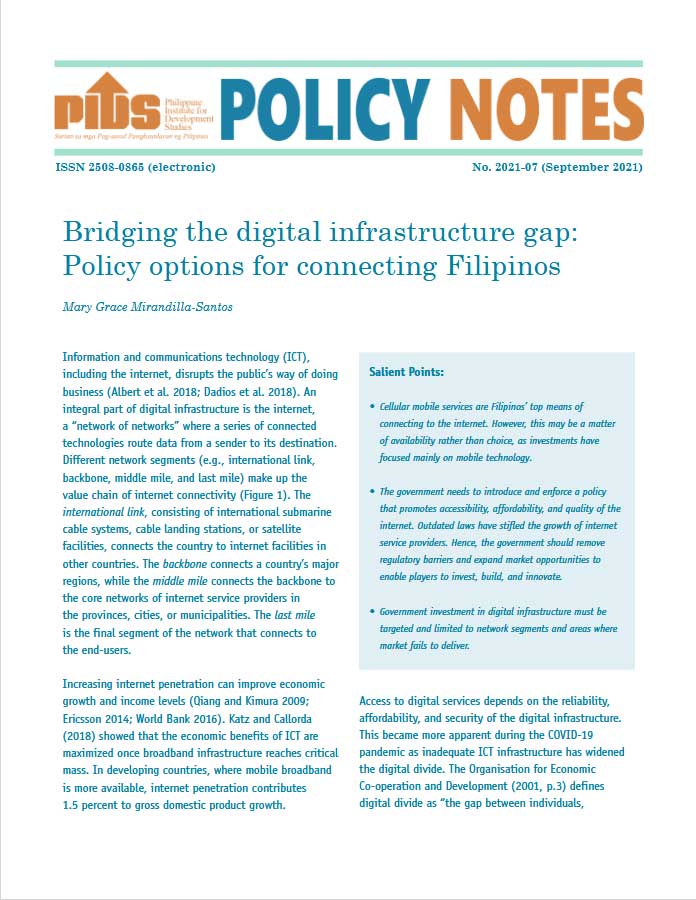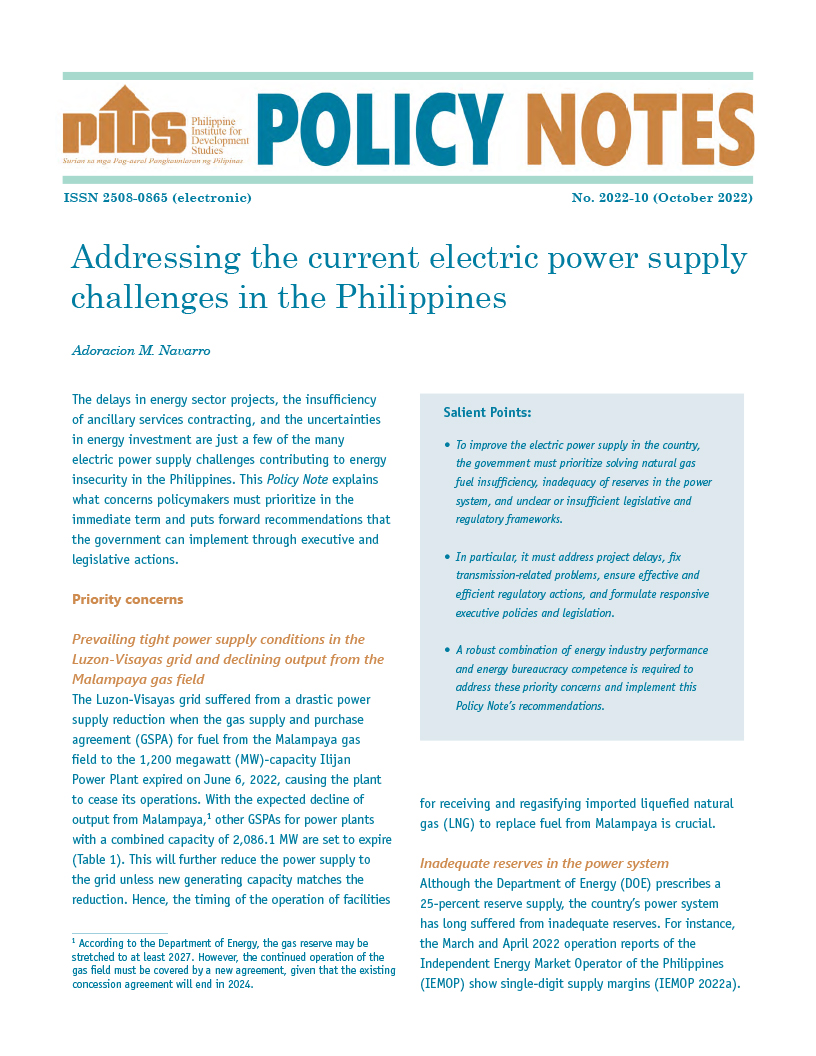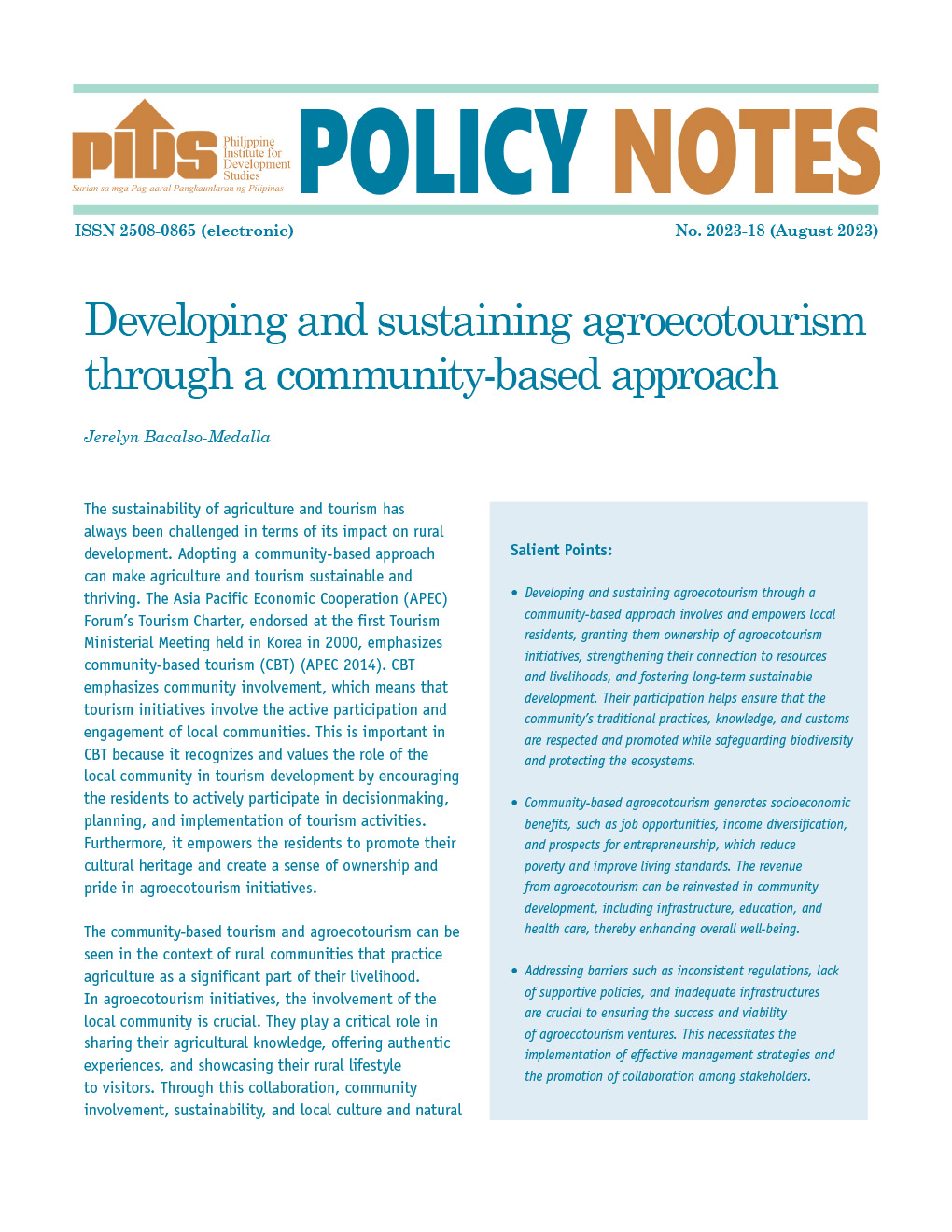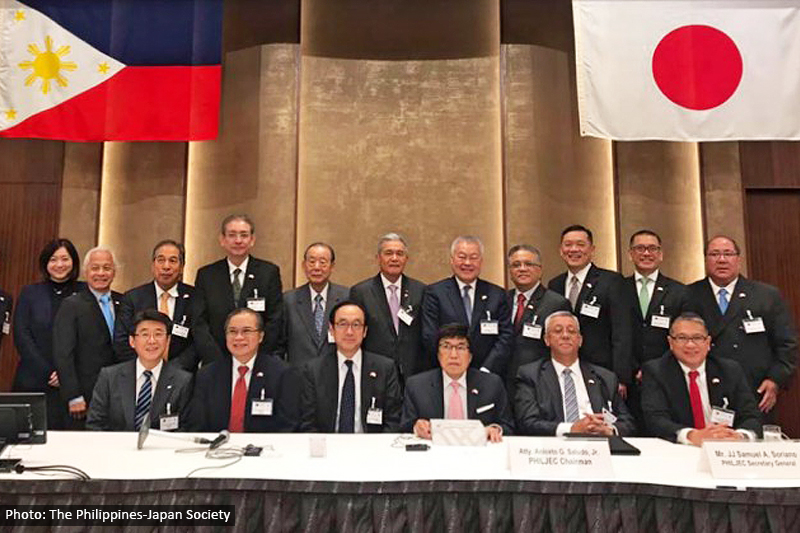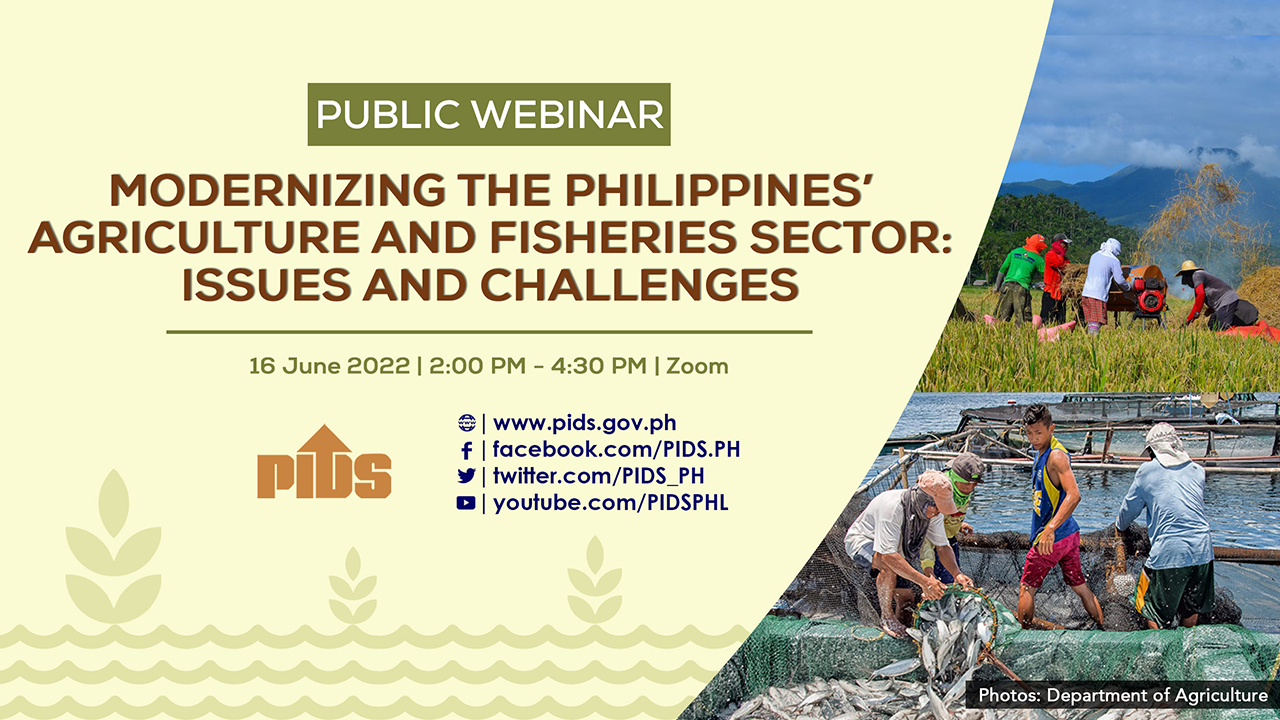CITING the burdensome regulatory framework in the Philippine tuna industry, a think tank said that government should reduce regulations for the industry to be more efficient and competitive.CITING the burdensome regulatory framework in the Philippine tuna industry, a think tank said that government should reduce regulations for the industry to be more efficient and competitive. Fishing is one of the major industries in the Philippines’ agriculture, fisheries, and forestry sector. However, its contribution to the economy is still minimal: only 1.7 percent of the gross domestic product, said the study by the Philippine Institute for Development Studies (PIDS). PIDS President Gilberto Llanto, research analyst Maria Kristina Ortiz, and former supervising research specialist Cherry Ann Madriaga conducted the study, titled “Reducing Unnecessary Regulatory Burden: The Philippine Tuna Industry.” Among their findings was that in business registration alone, there are a number of steps and requirements that need to be simplified to shorten the process. At present, tuna investors have to comply with the requirements and certifications set not just by their local government units (LGUs) but also by the different regulatory bodies, such as the Bureau of Fisheries and Aquatic Resources (BFAR) and the Marine Industry Authority (Marina), which are located in different cities and towns. “This makes the whole process costly and tedious, especially for small operators,” the authors said. “Certain steps have to be undertaken in the BFAR regional offices, which means that processing time depends on the availability of inspectors,” they said. Tuna companies also have to make sure they comply with standards set by the BFAR and the Food and Drug Authority (FDA), such as the cooling/chilling temperature that must be applied throughout the handling process, the essential composition and quality factors, standards for food additives and contaminants, proper hygiene and handling practices, proper packaging and labelling practices, methods of sampling, examination and analysis of products, definition of defective products, and the requirements for lot acceptance. The final stages of marketing and distribution are also no easy feat for companies, as their exports need to undergo laboratory tests depending on the requirements of the importing country. The authors identified other reasons that made the enforcement of regulations inefficient, such as the inadequate staffing on the side of the regulator, and lack of proper and effective communication and consultation mechanisms. They urged regulatory agencies to use technology to expedite their processes. (SDR/SunStar Philippines) Fishing is one of the major industries in the Philippines’ agriculture, fisheries, and forestry sector. However, its contribution to the economy is still minimal: only 1.7 percent of the gross domestic product, said the study by the Philippine Institute for Development Studies (PIDS). CITING the burdensome regulatory framework in the Philippine tuna industry, a think tank said that government should reduce regulations for the industry to be more efficient and competitive. Fishing is one of the major industries in the Philippines’ agriculture, fisheries, and forestry sector. However, its contribution to the economy is still minimal: only 1.7 percent of the gross domestic product, said the study by the Philippine Institute for Development Studies (PIDS). PIDS President Gilberto Llanto, research analyst Maria Kristina Ortiz, and former supervising research specialist Cherry Ann Madriaga conducted the study, titled “Reducing Unnecessary Regulatory Burden: The Philippine Tuna Industry.” Among their findings was that in business registration alone, there are a number of steps and requirements that need to be simplified to shorten the process. At present, tuna investors have to comply with the requirements and certifications set not just by their local government units (LGUs) but also by the different regulatory bodies, such as the Bureau of Fisheries and Aquatic Resources (BFAR) and the Marine Industry Authority (Marina), which are located in different cities and towns. “This makes the whole process costly and tedious, especially for small operators,” the authors said. “Certain steps have to be undertaken in the BFAR regional offices, which means that processing time depends on the availability of inspectors,” they said. Tuna companies also have to make sure they comply with standards set by the BFAR and the Food and Drug Authority (FDA), such as the cooling/chilling temperature that must be applied throughout the handling process, the essential composition and quality factors, standards for food additives and contaminants, proper hygiene and handling practices, proper packaging and labelling practices, methods of sampling, examination and analysis of products, definition of defective products, and the requirements for lot acceptance. The final stages of marketing and distribution are also no easy feat for companies, as their exports need to undergo laboratory tests depending on the requirements of the importing country. The authors identified other reasons that made the enforcement of regulations inefficient, such as the inadequate staffing on the side of the regulator, and lack of proper and effective communication and consultation mechanisms. They urged regulatory agencies to use technology to expedite their processes. (SDR/SunStar Philippines) PIDS President Gilberto Llanto, research analyst Maria Kristina Ortiz, and former supervising research specialist Cherry Ann Madriaga conducted the study, titled “Reducing Unnecessary Regulatory Burden: The Philippine Tuna Industry.” Among their findings was that in business registration alone, there are a number of steps and requirements that need to be simplified to shorten the process.CITING the burdensome regulatory framework in the Philippine tuna industry, a think tank said that government should reduce regulations for the industry to be more efficient and competitive. Fishing is one of the major industries in the Philippines’ agriculture, fisheries, and forestry sector. However, its contribution to the economy is still minimal: only 1.7 percent of the gross domestic product, said the study by the Philippine Institute for Development Studies (PIDS). PIDS President Gilberto Llanto, research analyst Maria Kristina Ortiz, and former supervising research specialist Cherry Ann Madriaga conducted the study, titled “Reducing Unnecessary Regulatory Burden: The Philippine Tuna Industry.” Among their findings was that in business registration alone, there are a number of steps and requirements that need to be simplified to shorten the process. At present, tuna investors have to comply with the requirements and certifications set not just by their local government units (LGUs) but also by the different regulatory bodies, such as the Bureau of Fisheries and Aquatic Resources (BFAR) and the Marine Industry Authority (Marina), which are located in different cities and towns. “This makes the whole process costly and tedious, especially for small operators,” the authors said. “Certain steps have to be undertaken in the BFAR regional offices, which means that processing time depends on the availability of inspectors,” they said. Tuna companies also have to make sure they comply with standards set by the BFAR and the Food and Drug Authority (FDA), such as the cooling/chilling temperature that must be applied throughout the handling process, the essential composition and quality factors, standards for food additives and contaminants, proper hygiene and handling practices, proper packaging and labelling practices, methods of sampling, examination and analysis of products, definition of defective products, and the requirements for lot acceptance. The final stages of marketing and distribution are also no easy feat for companies, as their exports need to undergo laboratory tests depending on the requirements of the importing country. The authors identified other reasons that made the enforcement of regulations inefficient, such as the inadequate staffing on the side of the regulator, and lack of proper and effective communication and consultation mechanisms. They urged regulatory agencies to use technology to expedite their processes. (SDR/SunStar Philippines) At present, tuna investors have to comply with the requirements and certifications set not just by their local government units (LGUs) but also by the different regulatory bodies, such as the Bureau of Fisheries and Aquatic Resources (BFAR) and the Marine Industry Authority (Marina), which are located in different cities and towns. CITING the burdensome regulatory framework in the Philippine tuna industry, a think tank said that government should reduce regulations for the industry to be more efficient and competitive. Fishing is one of the major industries in the Philippines’ agriculture, fisheries, and forestry sector. However, its contribution to the economy is still minimal: only 1.7 percent of the gross domestic product, said the study by the Philippine Institute for Development Studies (PIDS). PIDS President Gilberto Llanto, research analyst Maria Kristina Ortiz, and former supervising research specialist Cherry Ann Madriaga conducted the study, titled “Reducing Unnecessary Regulatory Burden: The Philippine Tuna Industry.” Among their findings was that in business registration alone, there are a number of steps and requirements that need to be simplified to shorten the process. At present, tuna investors have to comply with the requirements and certifications set not just by their local government units (LGUs) but also by the different regulatory bodies, such as the Bureau of Fisheries and Aquatic Resources (BFAR) and the Marine Industry Authority (Marina), which are located in different cities and towns. “This makes the whole process costly and tedious, especially for small operators,” the authors said. “Certain steps have to be undertaken in the BFAR regional offices, which means that processing time depends on the availability of inspectors,” they said. Tuna companies also have to make sure they comply with standards set by the BFAR and the Food and Drug Authority (FDA), such as the cooling/chilling temperature that must be applied throughout the handling process, the essential composition and quality factors, standards for food additives and contaminants, proper hygiene and handling practices, proper packaging and labelling practices, methods of sampling, examination and analysis of products, definition of defective products, and the requirements for lot acceptance. The final stages of marketing and distribution are also no easy feat for companies, as their exports need to undergo laboratory tests depending on the requirements of the importing country. The authors identified other reasons that made the enforcement of regulations inefficient, such as the inadequate staffing on the side of the regulator, and lack of proper and effective communication and consultation mechanisms. They urged regulatory agencies to use technology to expedite their processes. (SDR/SunStar Philippines) This makes the whole process costly and tedious, especially for small operators,” the authors said.CITING the burdensome regulatory framework in the Philippine tuna industry, a think tank said that government should reduce regulations for the industry to be more efficient and competitive. Fishing is one of the major industries in the Philippines’ agriculture, fisheries, and forestry sector. However, its contribution to the economy is still minimal: only 1.7 percent of the gross domestic product, said the study by the Philippine Institute for Development Studies (PIDS). PIDS President Gilberto Llanto, research analyst Maria Kristina Ortiz, and former supervising research specialist Cherry Ann Madriaga conducted the study, titled “Reducing Unnecessary Regulatory Burden: The Philippine Tuna Industry.” Among their findings was that in business registration alone, there are a number of steps and requirements that need to be simplified to shorten the process. At present, tuna investors have to comply with the requirements and certifications set not just by their local government units (LGUs) but also by the different regulatory bodies, such as the Bureau of Fisheries and Aquatic Resources (BFAR) and the Marine Industry Authority (Marina), which are located in different cities and towns. “This makes the whole process costly and tedious, especially for small operators,” the authors said. “Certain steps have to be undertaken in the BFAR regional offices, which means that processing time depends on the availability of inspectors,” they said. Tuna companies also have to make sure they comply with standards set by the BFAR and the Food and Drug Authority (FDA), such as the cooling/chilling temperature that must be applied throughout the handling process, the essential composition and quality factors, standards for food additives and contaminants, proper hygiene and handling practices, proper packaging and labelling practices, methods of sampling, examination and analysis of products, definition of defective products, and the requirements for lot acceptance. The final stages of marketing and distribution are also no easy feat for companies, as their exports need to undergo laboratory tests depending on the requirements of the importing country. The authors identified other reasons that made the enforcement of regulations inefficient, such as the inadequate staffing on the side of the regulator, and lack of proper and effective communication and consultation mechanisms. They urged regulatory agencies to use technology to expedite their processes. (SDR/SunStar Philippines) Certain steps have to be undertaken in the BFAR regional offices, which means that processing time depends on the availability of inspectors,” they said.CITING the burdensome regulatory framework in the Philippine tuna industry, a think tank said that government should reduce regulations for the industry to be more efficient and competitive. Fishing is one of the major industries in the Philippines’ agriculture, fisheries, and forestry sector. However, its contribution to the economy is still minimal: only 1.7 percent of the gross domestic product, said the study by the Philippine Institute for Development Studies (PIDS). PIDS President Gilberto Llanto, research analyst Maria Kristina Ortiz, and former supervising research specialist Cherry Ann Madriaga conducted the study, titled “Reducing Unnecessary Regulatory Burden: The Philippine Tuna Industry.” Among their findings was that in business registration alone, there are a number of steps and requirements that need to be simplified to shorten the process. At present, tuna investors have to comply with the requirements and certifications set not just by their local government units (LGUs) but also by the different regulatory bodies, such as the Bureau of Fisheries and Aquatic Resources (BFAR) and the Marine Industry Authority (Marina), which are located in different cities and towns. “This makes the whole process costly and tedious, especially for small operators,” the authors said. “Certain steps have to be undertaken in the BFAR regional offices, which means that processing time depends on the availability of inspectors,” they said. Tuna companies also have to make sure they comply with standards set by the BFAR and the Food and Drug Authority (FDA), such as the cooling/chilling temperature that must be applied throughout the handling process, the essential composition and quality factors, standards for food additives and contaminants, proper hygiene and handling practices, proper packaging and labelling practices, methods of sampling, examination and analysis of products, definition of defective products, and the requirements for lot acceptance. The final stages of marketing and distribution are also no easy feat for companies, as their exports need to undergo laboratory tests depending on the requirements of the importing country. The authors identified other reasons that made the enforcement of regulations inefficient, such as the inadequate staffing on the side of the regulator, and lack of proper and effective communication and consultation mechanisms. They urged regulatory agencies to use technology to expedite their processes. (SDR/SunStar Philippines) Tuna companies also have to make sure they comply with standards set by the BFAR and the Food and Drug Authority (FDA), such as the cooling/chilling temperature that must be applied throughout the handling process, the essential composition and quality factors, standards for food additives and contaminants, proper hygiene and handling practices, proper packaging and labelling practices, methods of sampling, examination and analysis of products, definition of defective products, and the requirements for lot acceptance. CITING the burdensome regulatory framework in the Philippine tuna industry, a think tank said that government should reduce regulations for the industry to be more efficient and competitive. Fishing is one of the major industries in the Philippines’ agriculture, fisheries, and forestry sector. However, its contribution to the economy is still minimal: only 1.7 percent of the gross domestic product, said the study by the Philippine Institute for Development Studies (PIDS). PIDS President Gilberto Llanto, research analyst Maria Kristina Ortiz, and former supervising research specialist Cherry Ann Madriaga conducted the study, titled “Reducing Unnecessary Regulatory Burden: The Philippine Tuna Industry.” Among their findings was that in business registration alone, there are a number of steps and requirements that need to be simplified to shorten the process. At present, tuna investors have to comply with the requirements and certifications set not just by their local government units (LGUs) but also by the different regulatory bodies, such as the Bureau of Fisheries and Aquatic Resources (BFAR) and the Marine Industry Authority (Marina), which are located in different cities and towns. “This makes the whole process costly and tedious, especially for small operators,” the authors said. “Certain steps have to be undertaken in the BFAR regional offices, which means that processing time depends on the availability of inspectors,” they said. Tuna companies also have to make sure they comply with standards set by the BFAR and the Food and Drug Authority (FDA), such as the cooling/chilling temperature that must be applied throughout the handling process, the essential composition and quality factors, standards for food additives and contaminants, proper hygiene and handling practices, proper packaging and labelling practices, methods of sampling, examination and analysis of products, definition of defective products, and the requirements for lot acceptance. The final stages of marketing and distribution are also no easy feat for companies, as their exports need to undergo laboratory tests depending on the requirements of the importing country. The authors identified other reasons that made the enforcement of regulations inefficient, such as the inadequate staffing on the side of the regulator, and lack of proper and effective communication and consultation mechanisms. They urged regulatory agencies to use technology to expedite their processes. (SDR/SunStar Philippines) The final stages of marketing and distribution are also no easy feat for companies, as their exports need to undergo laboratory tests depending on the requirements of the importing country. CITING the burdensome regulatory framework in the Philippine tuna industry, a think tank said that government should reduce regulations for the industry to be more efficient and competitive. Fishing is one of the major industries in the Philippines’ agriculture, fisheries, and forestry sector. However, its contribution to the economy is still minimal: only 1.7 percent of the gross domestic product, said the study by the Philippine Institute for Development Studies (PIDS). PIDS President Gilberto Llanto, research analyst Maria Kristina Ortiz, and former supervising research specialist Cherry Ann Madriaga conducted the study, titled “Reducing Unnecessary Regulatory Burden: The Philippine Tuna Industry.” Among their findings was that in business registration alone, there are a number of steps and requirements that need to be simplified to shorten the process. At present, tuna investors have to comply with the requirements and certifications set not just by their local government units (LGUs) but also by the different regulatory bodies, such as the Bureau of Fisheries and Aquatic Resources (BFAR) and the Marine Industry Authority (Marina), which are located in different cities and towns. “This makes the whole process costly and tedious, especially for small operators,” the authors said. “Certain steps have to be undertaken in the BFAR regional offices, which means that processing time depends on the availability of inspectors,” they said. Tuna companies also have to make sure they comply with standards set by the BFAR and the Food and Drug Authority (FDA), such as the cooling/chilling temperature that must be applied throughout the handling process, the essential composition and quality factors, standards for food additives and contaminants, proper hygiene and handling practices, proper packaging and labelling practices, methods of sampling, examination and analysis of products, definition of defective products, and the requirements for lot acceptance. The final stages of marketing and distribution are also no easy feat for companies, as their exports need to undergo laboratory tests depending on the requirements of the importing country. The authors identified other reasons that made the enforcement of regulations inefficient, such as the inadequate staffing on the side of the regulator, and lack of proper and effective communication and consultation mechanisms. They urged regulatory agencies to use technology to expedite their processes. (SDR/SunStar Philippines) The authors identified other reasons that made the enforcement of regulations inefficient, such as the inadequate staffing on the side of the regulator, and lack of proper and effective communication and consultation mechanisms. They urged regulatory agencies to use technology to expedite their processes. (SDR/SunStar Philippines)

